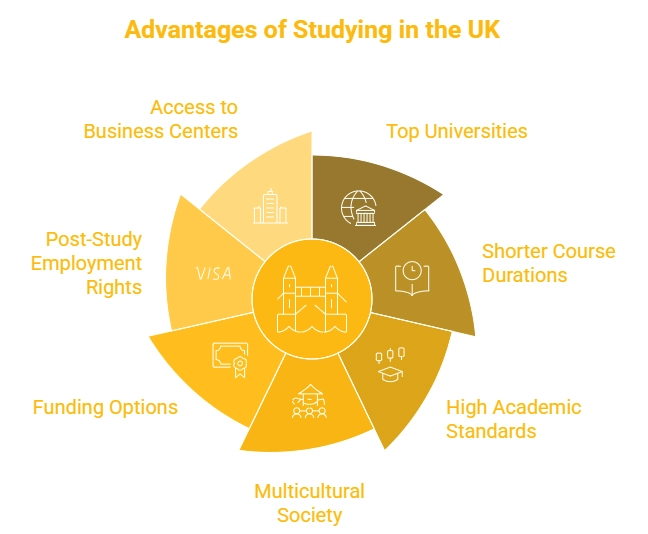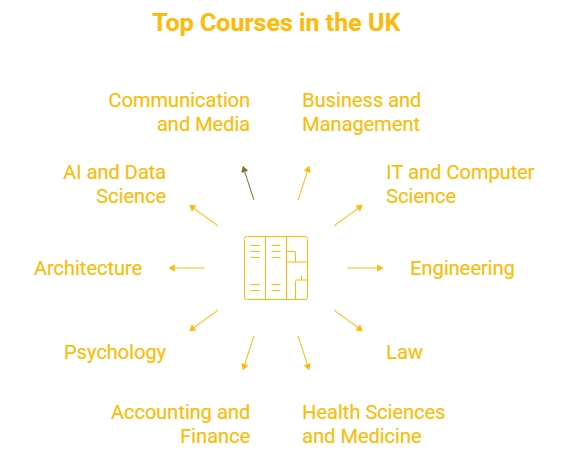Study abroad allows every student to discover and broaden their horizons. Become an adaptable global contender by Studying Abroad!
Choosing to work, study, or settle overseas is a significant decision. Y-Path offers a structured framework to help you make an informed decision.
Discover your perfect study stream with our unique, scientific approach to career guidance.
Inquiry
Welcome! Your journey starts here...
Expert counselling
Our experts will interact with you and guide you based on your requirements.
Eligibility
Sign up with us to check your eligibility
Documentation
Expert assistance in organizing the required documents.
Processing
Assist you in every step of visa application.
Studying abroad is a life-changing experience. Find the right course and university with Y-Axis.
World-class coaching program to cater to your needs
We want to transform you to become a global Indian

The UK education system is designed to encourage critical thinking, creativity, and practical knowledge.
Key features include:
Although some intakes take place during January or April, the academic year normally starts in September.

Undergraduate programs in the UK typically last three years (four in Scotland), and they consist of:
Students can also choose to enroll in foundation or pathway programs, if they do not meet the requirements for direct entry.
In the UK, postgraduate education includes of:
Research degrees prioritize independent study, whereas taught programs concentrate on coursework.
You must apply for a student visa (formerly known as a Tier 4 General Student visa) if you are an international student intending to study in the UK. For the length of your course, the visa permits you to attend an accredited UK university.
To apply for a Student visa, you'll need to provide the following:
Confirmation of Acceptance for Studies (CAS)
Following an offer of admission to a course, your UK university or college will issue a Confirmation of Acceptance for Studies (CAS). This special reference number is necessary for your visa application.
Proof of Acceptance at a UK Institution
You need a verified offer from a UK university or college that is a licensed student sponsor.
Financial Proof
You have to demonstrate that you have sufficient funds to cover both your living expenses and course fees in the UK.
Proficiency in the English Language
You might be required to prove your English proficiency through an authorized test (like the TOEFL, IELTS, etc.) based on your nationality and course level.
Valid Passport or Travel Document
Required to confirm your identity and eligibility for travel abroad.
Educational Background
Records attesting to your prior academic performance, as mandated by your university.
Test Results for Tuberculosis (TB)
Only necessary if you are traveling from a specific nation. The UK government's list of national TB test requirements is available for you to review.
ATAS Certification (if relevant)
An Academic Technology Approval Scheme certificate may be necessary for certain postgraduate courses, particularly in science or engineering.
For international students applying from outside the UK, the application fee for a UK student visa is £490. The administrative costs of obtaining your visa, running background checks, and authorizing you to study in the UK are covered by this charge.
After earning their degree, international students can stay in the UK for up to two years thanks to the Graduate Route Visa offered by the UK. For people who want to transition into long-term employment, explore career options, or obtain work experience, this path is perfect.
What is Graduate Route Visa?
Eligible international graduates can remain in the UK and work or search for work at any skill level without sponsorship thanks to the Graduate Route Visa, formerly known as the Post-Study Work Visa. To apply, you don't need a job offer.
To apply for the Graduate Route visa, applicants must meet the following:
Validity of the Graduate Route Visa
Step 1: Get a Confirmation of Acceptance for Studies (CAS) from your UK university.
Step 2: Collect the necessary paperwork, such as your passport, proof of income, academic credentials, English language skills, and, if necessary, a TB test.
Step 3: Use the official UK government visa website to submit your application.
Step 4: Pay the Immigration Health Surcharge (IHS) and the £490 visa fee.
Step 5: For biometrics, visit the nearest visa application center.
Step 6: Receive a decision in three weeks. You will obtain your visa and BRP upon approval.
Many of the UK's universities are ranked among the best in the world by the QS World University Rankings 2025, demonstrating the country's continued reputation for academic excellence.
These rankings are established using important metrics like:
Below is the list of Top 10 UK Universities featured in the latest QS Rankings.
| Serial No. | University | QS World Ranking 2025 |
| 1 | Imperial College London | 2 |
| 2 | University of Oxford | 3 |
| 3 | University of Cambridge | 5 |
| 4 | University College London (UCL) | 9 |
| 5 | The University of Edinburgh | 22 |
| 6 | The University of Manchester | 32 |
| 7 | King’s College London (KCL) | 38 |
| 8 | London School of Economics and Political Science (LSE) | 45 |
| 9 | University of Bristol | 55 |
| 10 | University of Warwick | 67 |
| Criteria | Public Universities | Private Universities |
| Funding | Government-funded | Privately funded |
| Tuition fees | Generally lower | High |
| Recognition | Widely recognized | Accredited nationally |
| Popularity | University of Oxford, University of Manchester, etc. | University of Buckingham, Regent’s University London |
| Category | Details |
| Popular Programs | MBA, International Business, Marketing |
| Tuition Fee | £15,000 – £25,000 |
| Top Universities | LSE, Warwick, Manchester |
| Job Prospects | High demand in finance, consulting, startups |
| Average Salary | £30,000 – £60,000 |
| Category | Details |
| Popular Programs | Cybersecurity, AI, Software Development |
| Tuition Fee | £15,000 – £23,000 |
| Top Universities | Oxford, Imperial, UCL |
| Job Prospects | Huge growth in tech sector and IT roles |
| Average Salary | £35,000 – £65,000 |
| Category | Details |
| Popular Programs | Civil, Mechanical, Electrical Engineering |
| Tuition Fee | £16,000 – £28,000 |
| Top Universities | Cambridge, Imperial, Bristol |
| Job Prospects | Infrastructure, manufacturing, and R&D roles |
| Average Salary | £30,000 – £55,000 |
| Category | Details |
| Popular Programs | LLB, International Law, Criminology |
| Tuition Fee | £15,000 – £22,000 |
| Top Universities | Oxford, UCL, King's College London |
| Job Prospects | Legal firms, civil service, NGOs |
| Average Salary | £28,000 – £60,000 |
| Category | Details |
| Popular Programs | MBBS, Public Health, Nursing |
| Tuition Fee | £20,000 – £38,000 |
| Top Universities | Cambridge, Edinburgh, King's College |
| Job Prospects | Doctors, nurses, public health officials |
| Average Salary | £32,000 – £75,000 |
| Category | Details |
| Popular Programs | BSc Accounting, MSc Finance, Audit & Risk |
| Tuition Fee | £14,000 – £22,000 |
| Top Universities | LSE, Manchester, Warwick |
| Job Prospects | Finance, banking, audit firms |
| Average Salary | £30,000 – £55,000 |
| Category | Details |
| Popular Programs | Clinical Psychology, Counseling, Neuropsychology |
| Tuition Fee | £14,000 – £20,000 |
| Top Universities | UCL, King’s College London, Glasgow |
| Job Prospects | Therapy, social work, education, research |
| Average Salary | £28,000 – £45,000 |
| Category | Details |
| Popular Programs | Urban Design, Architectural Technology |
| Tuition Fee | £15,000 – £23,000 |
| Top Universities | Bath, UCL, Sheffield |
| Job Prospects | Architecture firms, real estate, construction |
| Average Salary | £30,000 – £50,000 |
| Category | Details |
| Popular Programs | MSc AI, Data Analytics, Machine Learning |
| Tuition Fee | £16,000 – £25,000 |
| Top Universities | Imperial, Edinburgh, Southampton |
| Job Prospects | Tech, finance, research, healthcare |
| Average Salary | £35,000 – £70,000 |
| Category | Details |
| Popular Programs | Digital Media, PR, Journalism |
| Tuition Fee | £13,000 – £20,000 |
| Top Universities | LSE, Goldsmiths, Cardiff |
| Job Prospects | Media, marketing, corporate communication |
| Average Salary | £25,000 – £45,000 |
These courses offer strong career prospects and high ROI globally.

Step 1: Search for courses that fit your interests and professional objectives. Investigate your options using tools such as university league tables, open days, and UCAS.
Step 2: Academic and subject-specific entrance requirements are set by each course and university (e.g., A-levels, BTECs, or Scottish Highers).
Step 3: Highlight your accomplishments, driving forces, and suitability for the course. In the selection process, this is crucial.
Step 4: Apply Through UCAS(Universities and Colleges Admissions Service)
Step 5: Interviews, auditions, or portfolios may be required for some courses, such as architecture, medicine, or art.
Step 6: Choose an insurance company and track your offers on UCAS Track.
Step 7: Apply for tuition and maintenance loans through Student Finance England (or the appropriate organization in Wales, Scotland, or Northern Ireland) if you qualify.
Step 8: Secure accommodation, register for services at the university, and prepare for your first semester.
| Part-time job role | Average Hourly Pay |
| Retail Assistant | £9.50 – £11.50 |
| Cafe Employees | £9.00 – £11.00 |
| Supermarket staff | £9.50 – £12.00 |
| Online or in-person tutoring | £15.00 – £30.00 |
| Administrative Assistant | £10.00 – £13.00 |
| Delivery Driver (licensed) | £11.00 – £14.00 |
| Warehouse Operative | £10.00 – £12.50 |
| Receptionist | £10.00 – £12.00 |
| Library Assistant | £9.50 – £11.50 |
| Customer Support representative | £10.00 – £13.00 |
London based jobs may pay more because of high cost of living.
Graduating from a UK universities opens a wide range of opportunities across industries, sectors, and locations. The UK has excellent support and pathways for everyone, whether your goal is to start your own business, pursue postgraduate studies, or enter the workforce.
Common Career Paths after Graduation
Full-Time Work
Graduate Schemes
Further Study
Graduating from UK universities offer strong job prospects across wide range of industries. UK students benefit from career support, networking opportunities, and competitive starting salaries, as many institutions boast high employability rates and access to well-structured graduate schemes. The return on investment (ROI) is especially notable for degrees in industries like finance, technology, law, and healthcare, where graduates frequently recover their educational expenses in a few years due to higher earning potential.
| Name of the University | Annual Fees | Job Placement | Return on Investment |
| University of Oxford | £9,250 | Over 91% employed or in further study within 6 months | Strong ROI across law, public service, and research, long-term salary growth |
| University of Cambridge | £9,250 | 90%+ placed in employment or further study | High ROI, especially in sciences, economics and engineering |
| London School of Economics | £9,250 | 89% employed within 6 months, strong industry links | Excellent ROI in finance, politics and consulting |
| University of Edinburgh | £1,820 (Scotland) / £9,250 (rest of UK) | 88% graduate employability | Good return, particularly for academic, legal, and public sector roles |
| University of Manchester | £9,250 | 86%+ employed within 15 months | Strong ROI in STEM, business and health sciences |
| University of Warwick | £9,250 | 90%+ placed in jobs or further study | Very good ROI in economics, tech and management fields |
| King's College London | £9,250 | 87% graduate employability | High ROI in healthcare, social sciences, and international relations |
